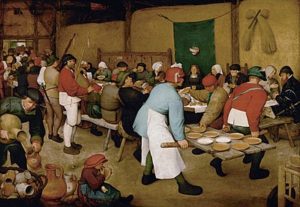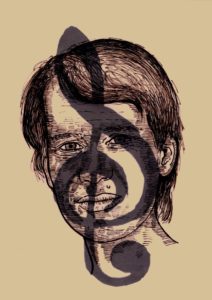Noam Chomsky: Trump Has Revealed The Extreme Fragility Of American Democracy
Even after Trump-appointed bureaucrat Emily W. Murphy of the General Services Administration signed a letter enabling Biden to start working with federal agencies and prepare for a transition of power, Donald Trump has personally continued to resist conceding, thus breaking the tradition of a peaceful transition to power.
What is he after with his bogus legal challenges of a “rigged and stolen” election? Can he really hope for a legislative coup? Is the contemporary United States a country divided not merely on political and ideological issues among its body politic, but, more frighteningly, along different conceptions of reality? And will Trumpism continue after Trump has left office? Revered public intellectual Noam Chomsky sheds light on these questions with groundbreaking insights in this exclusive interview for Truthout.
C.J. Polychroniou: U.S. election officials have declared the 2020 election “the most secure in American history.” Yet, the Trump campaign continues to mount legal challenges to the electoral process, pushing outrageous falsehoods, while Rudy Giuliani has gone so far as to make outlandish claims of a vast global conspiracy to steal the election from the Great Leader. In your view, what is really behind Trump’s legal challenges?
Noam Chomsky: Speculation of course, but I’ll indulge in a bad dream — which could become reality if we are not on guard, and if we fail to recognize that elections should be a brief interlude in a life of engaged activism, not a time to go home and leave matters in the hands of the victors.
I suspect that Trump and associates regard their legal challenges as a success in what seems a plausible strategy: keep the pot boiling and keep the loyal base at fever pitch, furious about the “stolen” election and the efforts of the insidious elites and the “deep state” to remove their savior from office.
That strategy seems to be working well. According to recent polls, “Three-quarters (77%) of Trump backers say Biden’s win was due to fraud” and “The anger among Trump’s base is tied to a belief that the election was stolen.” Rejection of the legal challenges with ridicule may please liberal circles, but for the base, it may be simply more proof of the Trump thesis: the hated elites will stop at nothing in their machinations.
Meanwhile, this strategy requires keeping the wrecking ball — Trump’s symbol — actively at work. Do nothing to deal with the pandemic, even delay in providing data to Biden’s team while a top nurse’s union warns of “catastrophic death” in the growing chaos while “our hospitals are knowingly still not prepared” and the government is on vacation.
Viewed through the lens of this vile strategy, if the pandemic gets worse, so much the better. Then local officials will try to impose restrictions and even lockdowns to control patriotic Americans — in line with the plans of the supposed “Communist-run deep state” — leading to economic harm and intrusions on normal life. Meanwhile, Trump and his associates could abandon other normal governmental activities so that when Biden establishes what they describe as a “fake government” on inauguration day, the immediate problems will be severe and failure likely.
On that day, which will live in infamy among the faithful, Trump might set up what he claims is an authentic government in Mar-a-Lago, with Mitch McConnell’s Senate in his pocket and a furious popular base. The next step would be to make the country ungovernable, a specialty that McConnell has been perfecting for a decade and that an accomplished demagogue like Trump can manage reflexively. Everything that goes wrong can be blamed on the treacherous “elites.”
Trump and associates might, as some have speculated, set up an alternative media empire, incorporating talk radio and other far right outlets but perhaps not Fox, which has shown occasional signs of disobedience. Then they could come roaring back into power in 2022-2024, feeding on growing discontent.
They would then be free to destroy the environment with abandon and maximize short-term profit for their primary constituency, impose discipline on what remains of government, tame the media, institute harsh authoritarian measures elsewhere, and continue with their abject service to their masters — the real elites, the very rich and the corporate sector, the decision-makers, as recent academic research once again establishes very clearly.
It’s of no little interest that we have to turn to the world’s leading business journal, the very respectable London Financial Times, to read some elementary truths about what could once claim to be a leading democracy: “Anyone with a pulse,” Financial Times Associate Editor Rana Foroohar writes, “knows that in the US today the system is rigged in favour of the wealthy and powerful.” Foroohar adds:
One particularly illuminating paper [just cited] found that considering the opinions of anyone outside that top 10 per cent was a far less accurate predictor of what happened to government policy. The numbers showed that: ‘not only do ordinary citizens not have uniquely substantial power over policy decisions; they have little or no independent influence on policy at all’. We have had decades of legislative tweaks to everything from tax policy to corporate governance and accounting standards that have favoured capital over labour. Supreme Court decisions such as the Citizens United case have also dramatically increased the amount of money funneled into political campaigning. This has left the nature of America’s political economy perilously close to an oligopoly.
If the Trump strategy is anything like the speculation outlined above, the prevailing oligopoly might look like a fond memory.
Anger and contempt for “elites” is not a mistake, even if the real elites are effectively concealed by the propaganda machine.
Boerenbruiloftghurt en schabouwelijk: neologismen en vergeetwoorden
 Taal leeft. Dat wil zeggen dat er woorden verdwijnen, dat er nieuwe woorden bij komen of bestaande woorden een tweede of andere betekenis krijgen. Dat woorden verdwijnen is wel erg neutraal gezegd. Dat nieuwe woorden of betekenissen ontstaan, wordt meestal goed geboekstaafd, bijvoorbeeld in taalrubrieken in dag-, week- of maandbladen, in boeken die een overzicht van nieuw aangetroffen woorden bieden of in verkiezingen van het woord van het jaar. En in elke nieuwe druk van de serieuze woordenboeken staan honderden neologismen ofwel nieuwvormingen.
Taal leeft. Dat wil zeggen dat er woorden verdwijnen, dat er nieuwe woorden bij komen of bestaande woorden een tweede of andere betekenis krijgen. Dat woorden verdwijnen is wel erg neutraal gezegd. Dat nieuwe woorden of betekenissen ontstaan, wordt meestal goed geboekstaafd, bijvoorbeeld in taalrubrieken in dag-, week- of maandbladen, in boeken die een overzicht van nieuw aangetroffen woorden bieden of in verkiezingen van het woord van het jaar. En in elke nieuwe druk van de serieuze woordenboeken staan honderden neologismen ofwel nieuwvormingen.
Zulke overzichten zijn er niet van woorden die niet of nauwelijks meer gebruikt worden, woordenboeken schrappen gewoon wat niet meer in de gratie is, het valt niet op dat je een bepaald woord al een paar jaar niet meer gehoord hebt. Woorden verdwijnen niet, ze sterven af.
Dat wordt duidelijk zichtbaar als er toch eens een poging tot overzicht gedaan wordt, zoals in 1000 vergeetwoorden om te koesteren (Utrecht/Antwerpen, 2015). Daarin staan honderden woorden die aangedragen zijn door luisteraars van het radioprogramma de Taalstaat, die een bedreigd of inmiddels uitgestorven woord opperden en aldus het “Gezelschap Van Geadopteerde Vergeetwoorden” vormden.
Woorden als stoop (oude maat voor vloeistoffen), geverseerd (bedreven, ingewijd in), mitsgaders (alsook, benevens) en peeuwen (klagen, jeremiëren). Of winterkeuken (gerechten die ’s winters gegeten worden), schabouwelijk (zeer bedenkelijk, heel slecht), druistig (wild, onbesuisd), kwispedoor (spuwbak) en kalefakker (praatjesmaker).
De schrijfster Nelleke Noordervliet, die de selectie deed, stelt in haar Inleiding: “Dat woorden in onbruik raken is niet verwonderlijk, maar met hun verdwijnen nemen ze een heel klein stukje geschiedenis met zich mee.” En: “Nee, we kunnen niet alles redden. Maar we kunnen wel onze taal in al haar rijkdom gebruiken.”
Corona
Neologismen ontstaan vaak in een cluster, een woordfamilie, een qua thema of vakgebied samenhangend geheel. Voor de hand liggende voorbeelden zijn popmuziek – rap, ska, grunge, ambient, noise – en de digitale revolutie, de wereld van printen en appen, van vlog en sexten.
Een actueel voorbeeld van zo’n cluster biedt de coronapandemie. Die heeft inmiddels al zo veel nieuwvormingen doen ontstaan, dat Ton den Boon, hoofdredacteur van de Dikke Van Dale, er een heus boek mee kon vullen: De taal van het nieuwe normaal. Corona in 1000 en enige woorden (Varik, 2020). Uiteraard komen daarin de termen ter sprake die sinds enige tijd tot ons dagelijks spraakgebruik horen, van af- en opschalen tot lockdown, van virusdreiging en vaccinatiewedloop.
 Maar het bevat ook pareltjes, met soms wel een beetje erg ruime toelichting: “doornroosjedeal: afspraak waarbij een levensvatbare onderneming die door bijzondere omstandigheden, zoals corona, financieel in moeilijkheden verkeert tijdelijk uitstel van betaling van de schuldeisers krijgt om niet failliet te hoeven gaan, zodat de onderneming bij een normalisering van de omstandigheden door kan; genoemd naar het sprookje Doornroosje van de gebroeders Grimm, dat gaat over een prinses die door een betovering honderd jaar in slaap ligt in een door doornstruiken omgeven kasteel, totdat een prins haar komt wakker kussen.”, “huidhonger: behoefte aan fysieke aanraking, m.n. bij mensen die langdurig alleen moeten zijn, bv. wanneer ze in hun eentje in quarantaine of zelfisolatie zitten”, “niesdab: niesreflex waarbij iemand zijn neus naar zijn elleboogholte van zijn ene arm brengt en daarin niest, terwijl hij zijn andere arm zijdelings omhoogsteekt, zo genoemd naar de dansmove dab” en “hoestschaamte: schaamte die iemand ervaart als hij hoest in het gezelschap van anderen die weleens zouden kunnen denken dat hij een ziekte heeft waardoor hij anderen zou kunnen besmetten”. Het is niet gewaagd te stellen, dat de meeste van deze woorden en uitdrukkingen zeer tijdgebonden zijn en een volgende druk van de Dikke Van Dale niet zullen halen.
Maar het bevat ook pareltjes, met soms wel een beetje erg ruime toelichting: “doornroosjedeal: afspraak waarbij een levensvatbare onderneming die door bijzondere omstandigheden, zoals corona, financieel in moeilijkheden verkeert tijdelijk uitstel van betaling van de schuldeisers krijgt om niet failliet te hoeven gaan, zodat de onderneming bij een normalisering van de omstandigheden door kan; genoemd naar het sprookje Doornroosje van de gebroeders Grimm, dat gaat over een prinses die door een betovering honderd jaar in slaap ligt in een door doornstruiken omgeven kasteel, totdat een prins haar komt wakker kussen.”, “huidhonger: behoefte aan fysieke aanraking, m.n. bij mensen die langdurig alleen moeten zijn, bv. wanneer ze in hun eentje in quarantaine of zelfisolatie zitten”, “niesdab: niesreflex waarbij iemand zijn neus naar zijn elleboogholte van zijn ene arm brengt en daarin niest, terwijl hij zijn andere arm zijdelings omhoogsteekt, zo genoemd naar de dansmove dab” en “hoestschaamte: schaamte die iemand ervaart als hij hoest in het gezelschap van anderen die weleens zouden kunnen denken dat hij een ziekte heeft waardoor hij anderen zou kunnen besmetten”. Het is niet gewaagd te stellen, dat de meeste van deze woorden en uitdrukkingen zeer tijdgebonden zijn en een volgende druk van de Dikke Van Dale niet zullen halen.
Den Boon ziet trouwens een parallel tussen de opmars van het virus en de groei die hij verwacht voor de pandemieneologismen: ”Lexicografisch gezien is dit niet meer dan een eerste inventarisatie van de coronawoordenschat, waarvan de omvang zich de komende jaren ongetwijfeld verdubbelt of verdrie- of verviervoudigt.”
Hij schreef overigens ook, samen met Julius ten Berge, het Verdwijnwoordenboek. Woorden die wegvielen uit onze woordenschat (’s-Hertogenbosch, 2008).
Scrummen
Waar vergeetwoorden bij gebrek aan gebruik langzaamaan uit beeld verdwijnen, is van nieuwvormingen meestal wel duidelijk waar en wanneer zij het licht zagen. Als Geert Wilders in de Tweede Kamer de hoofddoekjes van moslima’s “kopvodden” noemt, mag u rustig aannemen, dat daar brainstormsessies aan voorafgegaan zijn om tot een term te komen die tegelijk zo kwetsend mogelijk is en makkelijk in het spraakgebruik blijft hangen.
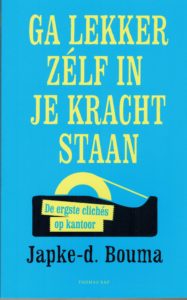 Dus als uw vaatwastabletten “zijdeglansparels” blijken te bevatten of in uw half volkoren zit “broodverbetermiddel“, stel u daarbij dan gerust een sessie voor waarin duur betaalde en daarom in strak pak gestoken en in door de zaak geleasde Maserati’s rond rijdende copywriters in lange vergaderingen en via speelse associatie-rondes tot die briljante vondsten komen. Japke-d. Bouma kent die sessies uit eigen ervaring en geeft in Ga lekker zèlf in je kracht staan. De ergste clichés op kantoor (Amsterdam, 2019) een vermakelijke blik in zo’n brainstormzitting, al heet dat tegenwoordig in die praktijk “scrummen”:
Dus als uw vaatwastabletten “zijdeglansparels” blijken te bevatten of in uw half volkoren zit “broodverbetermiddel“, stel u daarbij dan gerust een sessie voor waarin duur betaalde en daarom in strak pak gestoken en in door de zaak geleasde Maserati’s rond rijdende copywriters in lange vergaderingen en via speelse associatie-rondes tot die briljante vondsten komen. Japke-d. Bouma kent die sessies uit eigen ervaring en geeft in Ga lekker zèlf in je kracht staan. De ergste clichés op kantoor (Amsterdam, 2019) een vermakelijke blik in zo’n brainstormzitting, al heet dat tegenwoordig in die praktijk “scrummen”:
“Scrummen is een hele toestand met regels, rollen en pokerkaarten (..). Dat lijkt allemaal niet zo revolutionair, maar het grote voordeel van scrummen is dat er voor al die dingen die we al miljarden jaren hetzelfde deden nu allemaal chille Engelse woorden zijn verzonnen.
Zo heet een manager een ‘scrum master’, heet het begin een ‘kick off’, werk je niet, maar hou je korte ‘sprints’, heet de baas een ‘product owner’, heeft de klant een ‘user story’, en wordt de vergadering ‘stand up’ genoemd omdat je er bij moet staan want anders wordt het een gewone vergadering en dat is niet hip.”
Karnevers
Zo’n explosieve combinatie van creativiteit en speelsheid leidt gemakkelijk tot excessen, althans lexicografische. Een praktijkvoorbeeld.
In de jaren zeventig van de vorige eeuw was het oma. Grootmoeders cake, de opoe-fiets, grandma’s freshly baked cookies: als het maar op de een of andere manier aan een grootmoederfiguur was gekoppeld, gaf dat een product meteen een aura van ouderwetse betrouwbaarheid, vooroorlogse degelijkheid en onweerstaanbare nostalgie.
De advertenties en reclamecampagnes wedijverden om het meest getrouwe cliché van de oer-oma: een door het leven gegroefd gelaat maar met liefdevolle ogen, een brilletje – niet het allergoedkoopste uit de winkel maar toch onmiskenbaar van het ziekenfonds -, vertederend krullende grijze lokken, blauwgrijze spoeling van Schwarzkopf en een zwarte omslagdoek (zelf gehaakt!) rond de schouders tegen een kille nazomerbries.
Maar aan grootmoeders wervingskracht kwam in de jaren tachtig een einde toen de Hema – toch al nooit te beroerd om op een tendens in te haken – de opoefiets in haar kleurenfolders opnam. Toen moesten de reclamemakers uitkijken naar een ander clichébeeld. Nou ja, clichébeeld, in reclametermen heet dat vermoedelijk ‘een vergeneraliseerd individu met grote identificeringswaarde’. En dat werden Jan en Marie.
Lang voor het op het Binnenhof begon door te dringen, hadden de reclamejongens namelijk al heel scherp door dat het milieu een onderwerp met toekomst was: uitgestrekte groene weiden, tevreden grazende koeien, imposante wolkenluchten boven een polderdijk; u dacht toch niet dat Martine Bijl voor haar lol tussen de spitskolen zat?
De mensen hadden weer behoefte aan bewust eten, aan vers en gezond, aan goed kauwen voor je het doorslikt. Uit die filosofie kwam de boerenlandmelk voort. Vanuit die gedachte werd de met natuurlijke rechtsdraaiende melkzuren verrijkte drinkyoghurt ontworpen. Met dat beeld voor ogen kwam iemand op het idee de eeuwenoude hangop ‘umer’ te gaan noemen en op het deksel “herinnert aan hangop” te zetten.
En het werkte. Wat het verschil was, wist geen mens, maar het heette boerenland-dit of karnevers-dat, en dus werd het gekocht. En gevreten. Maar er is een grens, zelfs voor reclamemakers. Die werd bereikt toen P.N. – voluit: Boerderijmelkveredeling P(uur) N(atuur), dat zegt eigenlijk al genoeg – een “overheerlijke zachtzure standyoghurt” op de markt bracht. (Standyoghurt is, volgens mijn op kringlooppapier gedrukte macrobiologische encyclopedie, een lobbige roeryoghurt. Nu weet ik nog niets.)
Op de beker waarin dit kostelijk vocht verpakt is, prijkt met gepaste trots de naam: Boerenbruiloftghurt van Jan en Marie. Daaronder staat een hoogst onduidelijke afbeelding. Een bejaarde, wat kromgetrokken man giet een emmer leeg in een melkbus – dat zal Jan zijn – en wat verder zit iemand in zo’n alle geslachtskenmerken vervagende overall een koe te melken; dat moet dus Marie wezen.
Wat die twee oudjes, die tweemaal daags door noodweer en tegenwind het land op moeten om de uiers te legen, met een boerenbruiloft van doen hebben, is volmaakt onbegrijpelijk. En dat is misschien ook wel juist de bedoeling, want wat een boerenbruiloft – hossen, hijsen, speeksel dat uit de mondhoeken druipt, een eeltige hand die onder een rok tast; ja, als het op clichés aankomt, weet ik ook van wanten – met de lobbigheid van dioxinevrije melkzuren te maken heeft, zou zelfs de duurst betaalde reclamejongen, Maserati of niet, nog niet duidelijk kunnen maken.
—
Robert-Henk Zuidinga (1949) studeerde Nederlandse en Engelse Moderne Letterkunde aan de Universiteit van Amsterdam. Hij schrijft over literatuur, taal- en bij uitzondering – over film.
De drie delen Dit staat er bevatten de, volgens zijn eigen omschrijving, journalistieke nalatenschap van Zuidinga. De boeken zijn in eigen beheer uitgegeven. Belangstelling? Stuur een berichtje naar: info@rozenbergquarterly.com– wij sturen uw bericht door naar de auteur.
Dit staat er 1. Columns over taal en literatuur. Haarlem 2016. ISBN 9789492563040
Dit staat er II, Artikelen en interviews over literatuur. Haarlem 2017. ISBN 9789492563248
Dit staat er III. Bijnamen en Nederlied. Buitenlied en film, Haarlem 2019. ISBN 97894925636637
Merlijn Twaalfhoven – Het is aan ons ~ Waarom we de kunstenaar in onszelf nodig hebben om de wereld te redden.
In zijn idealistische en bevlogen boek ‘Het is aan ons’ beschrijft Merlijn Twaalfhoven hoe iedereen kan bijdragen aan het oplossen van wereldproblemen. Hij stelt zich ten doel de wereld te redden en analyseert hoe het kunstenaarschap hierbij kan helpen: kunst kan houvast bieden in onzekere tijden. Twaalfhoven spreekt niet over een mooi afgerond kunstwerk – kunst moet open zijn – en iedereen moet eraan mee kunnen doen. Kunst is een speeltuin, een laboratorium voor nieuwe verbintenissen en onbevangen vragen. Het proces verloopt van Waarnemen, Voelen, Denken naar Maken. Het komt samen in een praktisch idealisme.
Twaalfhoven is op zoek naar ‘de verbinding van de nabijheid’.
Dat vereist een systeemverandering, een gezamenlijke toekomstvisie die op een waarachtige manier de menselijke waarden naar buiten brengt. Een praktisch, procesmatig idealisme.
Als componist en theatermaker organiseerde Merlijn Twaalfhoven wereldwijd voorstellingen. Hij ging de concertzaal uit en zette de muziek midden in de wereld. Als altviolist reisde hij in 1996 naar Bosnië, vlak nadat de vrede was getekend. Zijn concerten werden ‘unieke ontmoetingen’. De plaats waar werd gespeeld, werd van cruciaal belang. Hij zag wat muziek kan betekenen, al was het natuurlijk niet voldoende om een blijvende verandering tot stand te brengen. Met zijn werk voegt hij ‘een druppeltje toe aan een emmer die zich langzaam vult met vrede, moed, hoop, contact en gelijkwaardigheid’. Hij maakt ons deelgenoot van zijn reizen naar ook andere conflictgebieden waar kunst het verschil kan maken: zoals een Syrisch vluchtelingenkamp in Jordanië, de buitenwijken van Sarajevo, een huiskamerfestival in Jeruzalem, een oude pistolenfabriek in Zaandam, de Carnegie Hall in New York en een VN-conferentie in Alpbach, waar de kunstenaar werd uitgenodigd om te praten over de rol van kunst bij het halen van VN-doelen. De ontmoeting leidde helaas niet tot een concreet vervolg.
Het maken van kunst is vooral uitbesteed aan professionals, aldus Twaalfhoven. We lijken het vermogen te verliezen om zelf emoties, twijfels en dromen tastbaar te maken en vertraging te creëren. Maar schoonheid en verwondering verdienen een plek in ons leven.
Iedereen heeft een kunstenaar in zich, vrij vertaald naar Joseph Beuys. We hebben een ‘kunstenaarsmindset’ nodig, een speelse, onderzoekende, open en creatieve houding om bij te dragen aan een betere wereld. We hebben het allemaal in ons om krachten te bundelen, verhalen te vertellen, en iets van waarde te maken, tastbaar te maken wat in onszelf zit. Dan maken we het verschil.
‘Het is aan ons’, aldus Merlijn Twaalfhoven.
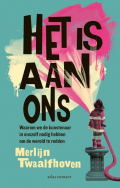 Hij sluit af met wat we kunnen leren van de kerk:
Hij sluit af met wat we kunnen leren van de kerk:
Ten eerste: markeer tijd en ruimte
Ten tweede: vind je houvast
Ten derde: spreek je idealen uit
Ten vierde: doe het samen
En ten slotte: vier je voortgang!
Atlas Contact, Amsterdam, 2020. ISBN9789045039800
Merlijn Twaalfhoven is componist en oprichter van The Turn Club, een samenwerkingsverband van kunstprofessionals, veranderaars en bruggenbouwers. Hij werkte o.a. met Het Nationale Ballet, Toneelgroep Amsterdam en het Kronos Quartet.
De bijeenkomst in Paradiso (d.d. 1 november 2020) naar aanleiding van het verschijnen van het boek ‘Het is aan ons. Waarom we de kunstenaar in onszelf nodig hebben om de wereld te redden.’:
Linda Bouws – St. Metropool Internationale Kunstprojecten
Zoveel soorten van verdriet: poëziecitaten in rouwadvertenties
Dood ben ik pas als jij me bent vergeten
Rust nu maar uit
Weggaan is iets anders dan het huis uitsluipen
Het gebruik om iemands overlijden publiekelijk te melden door middel van een rouwannonce in een dagblad is zeker meer dan twee eeuwen oud. Puck Kooij heeft er een boek aan gewijd. De titel, Heden gij, morgen ik. Gedenken in proza en poëzie (Amsterdam, 1995) is een variant op het gezegde “Heden ik, morgen gij” (in het Latijn hodie mihi, cras tibi), afkomstig uit een apocrief bijbelboek, met de betekenis “Wat mij vandaag overkomt, kan u morgen treffen”.
Kooij stelt in haar boek, dat de eerste rouwadvertentie verscheen in de “Oprechte Haarlemse Dingsdagse Courant van den 16 Augustus, 1791”. Die luidde
’s Gravenhage den 15 Augustus. ”In den nacht van den 12 op den 13 deezer, is alhier, aan den gevolgen van eene Borstkwaal, in den ouderdom van byna 67 Jaaren, overleden, de Wel-Eerwaardige en zeer Geleerde Heer CASPARUS VAN DER HEIDE.{..}
Zyne Assche ruste in vrede, en zyn Aandenken blyve in zegen, by alle zyne binnenlandsche en buitenlandsche Vrienden en Bekenden, aan welken mits deezen, hun geleeden verlies wordt bekend gemaakt, door den aangestelden Testaments-Executeur.“
Was de toon van zulke aankondigingen, hoewel plechtig, vooral zakelijk en informatief, gaandeweg verandert die. Kooij: “Halverwege de 19 de eeuw worden advertenties gekenmerkt door een soberder woordgebruik. (..) Spectaculaire veranderingen in de rouwadvertenties in vorm en inhoud deden zich vooral voor in de jaren negentig van de 20 e eeuw. De uitlatingen en uitroepen werden steeds creatiever en vrijmoediger, zodanig dat van terughoudendheid nauwelijks meer sprake is en de ‘emotie-cultuur’ hoogtij vierde.”
Tot die veranderingen hoort sindsdien ook het in de annonce opnemen van poëzieregels die een gemoedstoestand weergeven, hetzij nog door de overledene bij leven zelf bepaald, hetzij door de nabestaanden. Rouwpoëzie is minder bekend onder de naam funeraire poëzie, wat afstamt van het Franse funéraire, een begrafenis betreffend. Het komt ook voor in het woord funerarium, rouwcentrum.
Misschien wel het meet sprekende voorbeeld van de rol die een poëziecitaat ging innemen in de rouwannonce, is een gedicht van Nel Benschop (1918-2005):
In memoriam voor een vriend
Rust nu maar uit – je hebt je strijd gestreden.
Je hebt het als een moedig man gedaan.
Wie kan begrijpen, wat je hebt geleden?
En wie kan voelen, wat je hebt doorstaan?
Rust nu maar uit – je taak is afgekomen;
vandaag heeft God de kroon op ’t werk gezet
dat je eenmaal in Zijn kracht hebt ondernomen.
De zin was af. God heeft een punt gezet.
Maar ‘t valt ons moeilijk om de zin te vatten
van ‘t zwijgen van je laatste harteklop.
Misschien alleen maar dit: de afgematten
en moeden varen als met arendsvleuglen op …
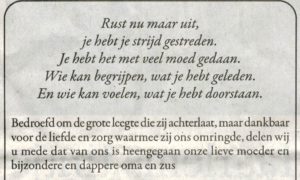 Benschops bundels horen tot de best verkochte in ons land en de beginregel(s) van dit In memoriam horen tot de meest geciteerde. De columnist Nico Scheepmaker viel op dat dit citeren niet altijd geheel letterlijk gebeurde. Sterker nog, hij turfde de varianten en wijdde daar in 1985 een artikel aan voor het maandblad Onze Taal, onder de titel “Rust nu maar uit: 77 variaties”. (Het stuk verscheen ook in een bundeling van zijn columns, Maar mooi! Beschouwingen over poëzie. Amsterdam, 1992).
Benschops bundels horen tot de best verkochte in ons land en de beginregel(s) van dit In memoriam horen tot de meest geciteerde. De columnist Nico Scheepmaker viel op dat dit citeren niet altijd geheel letterlijk gebeurde. Sterker nog, hij turfde de varianten en wijdde daar in 1985 een artikel aan voor het maandblad Onze Taal, onder de titel “Rust nu maar uit: 77 variaties”. (Het stuk verscheen ook in een bundeling van zijn columns, Maar mooi! Beschouwingen over poëzie. Amsterdam, 1992).
Zelden werd het gedicht in zijn geheel geciteerd, meestal werd volstaan met de eerste vier regels.
Varianten daarop waren bijvoorbeeld
Rust nu maar uit in vrede
Jij hebt je strijd gestreden
Geen mens begrijpt wat jij hebt doorstaan
Vol moed heb jij het begaan
of
Rust nu maar uit,
je hebt je strijd gestreden.
Wie kan voelen wat je hebt doorstaan,
wie kan begrijpen wat je hebt geleden.
Je hebt het als een moedig man doorstaan.
Rust nu maar uit
Chomsky: Voting Is Not The End. It’s Only The Beginning
Joe Biden is the winner of the 2020 election. Yet while Trump has lost, the Democrats failed to materialize the blue wave some expected — and Trump fared extremely well despite the pandemic. In this exclusive interview, Noam Chomsky shares some of his insights about Trump’s continuing popularity and what the left needs to do in the years ahead, emphasizing that voting is never an end — only a beginning.
C.J. Polychroniou: Although Biden has won the election, the Democrats failed to materialize a blue-wave landslide, and it is clear we will continue to deal with large-scale Trumpism. Given that you were extremely skeptical of the polls from day one, what do you think contributed to the massive turnout for Trump, even as Biden saw an even more massive turnout? Or, to phrase the questions differently, why is nearly half the country continuing to support a dangerous charlatan leader with such a feverish passion?
Noam Chomsky: The very fact that someone could be considered a serious candidate after just having killed tens if not hundreds of thousands of Americans through a disastrous response to COVID-19 is an extraordinary victory for Trump — and a defeat for the country, for the world and for hopes for a decent future.
Some of Trump’s victories are very revealing. A report on NPR discussed his victory in a solid Democratic county on the Texas-Mexico border with many poor Latinos that hadn’t voted Republican for a century, since Harding. The NPR analyst attributes Biden’s loss to his famous “gaffe” in the last debate, in which he said that we have to act to save human society from destruction in the not very distant future. Not his words, of course, but that’s the meaning of his statement: that we have to make moves to transition away from fossil fuels, which are central to the regional economy. Whether that’s the reason for the radical shift, or whether it’s attributable to another of the colossal Democratic organizing failures, the fact that the outcome is attributed to the gaffe is itself indicative of the rot in the dominant culture. In the U.S., it is [considered] a serious “gaffe” to dare to hint that we have to act to avoid a cataclysm.
Poor working people in the border area are not voting for the predictable consequences of Trump’s race toward cataclysm. They may simply be skeptical about what science predicts. Sixty percent of conservative Republicans (35 percent of moderate Republicans) believe that humans are contributing “not too much/not at all” to global warming. A poll reported in Science found that only 20 percent of Republicans trust scientists “a lot…to do what is right for the country.” Why then believe the dire predictions? These, after all, are the messages pounded into their heads daily by the White House and its media echo chamber.
South Texan working people may not be ready to sacrifice their lives and communities today on the basis of claims in elite circles that they are instructed not to trust. These tendencies cannot be blamed solely on Trump’s malevolence. They trace back to the failure of the Democratic Party to bring to the public a serious program to fend off environmental catastrophe while also improving lives and work — not because such programs don’t exist; they do. But because they don’t appeal to the donor-oriented Clintonite neoliberals who run the Democratic Party.
There’s more. Trump has shown political genius in tapping the poisonous currents that run right below the surface of American society. He has skillfully nourished and amplified the currents of white supremacy, racism and xenophobia that have deep roots in American history and culture, now exacerbated by fear that “they” will take over “our” country with its shrinking white majority. And the concerns are deep. A careful study by political scientist Larry Bartels reveals that Republicans feel that “the traditional American way of life is disappearing so fast that we may have to use force to save it,” and more than 40 percent agree that “a time will come when patriotic Americans have to take the law into their own hands.”
Irreconcilable Differences: The 2020 Elections Prove Again The U.S. As Outlier
The most consequential election in modern U.S. history won’t produce a winner for at least a few more days. And then, the result may be contested in the Supreme Court, with unforeseen consequences for the future of democratic order.
However, while much of the media and the public are consumed with scenarios as to how Biden, or Trump, can reach the magic number of 270 electoral votes, there are some highly disturbing trends and facts about the 2020 election that need to be analyzed if progressives in the U.S. can hope to advance a successful strategy in the years ahead.
First, the polls were wrong again. A blue wave did not materialize in spite of the highest voter turnout in a century and the huge demographic changes taking place all across the United States.
Second, Biden failed to perform as expected in spite of the country being in the midst of a catastrophic pandemic, with a criminally negligent president in charge who has misled the public about Coronavirus from day one and has intentionally spread dangerous information about it.
Third, Trump did much better than expected in spite of being a charlatan, the sort of a leader who says and does such outrageous and highly dangerous things that it is simply unimaginable that citizens in other advanced democracies would have tolerated him in their midst, let alone support with a feverous passion as so many Americans do.
The 2020 U.S. elections have revealed as strongly as possible that the country remains highly polarized, marked by irreconcilable differences between red and blue states. In fact, the U.S. is probably more divided today between red and blue than it was during the 1860s, and much of the credit for this accomplishment is due to the brilliant skills of the con artist occupying the White House for the last four years. Trump has exploited the anxieties, frustrations, and fears of white America, with its toxic ideological notion of racial superiority, in a manner that would have made Joseph Goebbels feel like an amateur.
Racism has always been around. But it is more alive and kicking in today’s USA than any other time since the 1950s or 1960s. This is why Trump’s neo-fascist political posturing is found to be so appealing among such huge segments of 21 st century Americans. Democracy, for Trump and many of his supporters, is an unnecessary luxury if it would mean building a society where whites are the minority. In fact, in a survey cited in Larry Bartels’s research article “Ethnic antagonism erodes Republicans’ commitment to democracy”, “most Republicans…agreed that ‘”the traditional American way of life is disappearing so fast that we may have to use force to save it.”’ https://www.pnas.org/content/117/37/22752
This is why there was a record turnout in the 2020 election: this was an election about white Americans, as Umair Haque, Director of the Havas Media Lab, artfully argued a few days ago in his essay “Is White America Really Ready to Reject Trump’s Fascism?” https://eand.co/is-white-america-really-ready-to-reject-trumps-fascism-cf88d6f9b48d
To be sure, the U.S. remains an outlier among highly advanced societies on many issues, because racism is the driving ideological force. The U.S. is the only country in the advanced industrialized world without a universal health care system, but with a warfare but no welfare state. https://www.salon.com/2020/08/08/as-the-pandemic-has-made-clear-america-has-no-welfare-state–but-we-sure-have-a-warfare-state/
The U.S.is alone among western countries with its continued use of the death penalty (where racial disparities continue even though the death penalty usage has declined), it has not ratified the UN Convention on the Rights of the Child, and has ratified fewer key human rights treaties than all other countries in the G20 group. Additionally, it never ratified the Equal Rights Amendment proposed in 1972, and it ranks 75th globally in women’s representation in government. https://www.cnbc.com/2019/03/04/the-us-ranks-75th-in-womens-representation-in-government.html
Indeed, white America is very different from the rest of the advanced world, as Haque points out in “Is White America Really Ready to Reject Trump’s Fascism?, in profoundly striking ways: “Voters in Europe and Canada — white majorities there — can be relied upon to act with some modicum of decency and humanity and common sense. They back, over and over again, what the world now considers modern social contracts that make up functioning, sophisticated societies — healthcare, retirement, education, childcare, and so on, for all, not just themselves. It would be a massive, massive shock if voters anywhere else in the West began to act like America’s white majority — they are so far off the scale of conservatism, in formal terms, that it might as well not exist.”
In sum, what the 2020 elections demonstrate, regardless of who wins the election, is that Trumpism will remain the dominant ideological and political movement in the third decade of the 21 st century in the United States. With or without Trump in the White House, white America will surely remain vigilant in its attempt to “safeguard America’s traditional values” and, in that context, progressive forces will have their hands full.
In the light of this, the creation of a “Popular Front,” a coalition of all democratic forces of the sort that took place in Europe in the mid-1930s to combat the rise of fascism, should be embraced as possibly the only coherent strategy to roll back Trumpism. But in 21 st century USA, this would mean a commitment first and foremost to the norms and values of an inclusive democracy within the context of class-and environmental politics.
As such, “identity politics,” which has gone from inclusion to division and has led to political tribalism in U.S. society, needs to be reassessed in a manner where its positive attributes are incorporated into a broader political agenda. But this is a story for another time.
—
C.J. Polychroniou is a political economist/political scientist who has taught and worked in universities and research centers in Europe and the United States. His main research interests are in European economic integration, globalization, the political economy of the United States and the deconstruction of neoliberalism’s politico-economic project. He is a regular contributor to Truthout as well as a member of Truthout’s Public Intellectual Project. He has published several books and his articles have appeared in a variety of journals, magazines, newspapers and popular news websites. Many of his publications have been translated into several foreign languages, including Croatian, French, Greek, Italian, Portuguese, Spanish and Turkish. He is the author of Optimism Over Despair: Noam Chomsky On Capitalism, Empire, and Social Change, an anthology of interviews with Chomsky originally published at Truthoutand collected by Haymarket Books.



